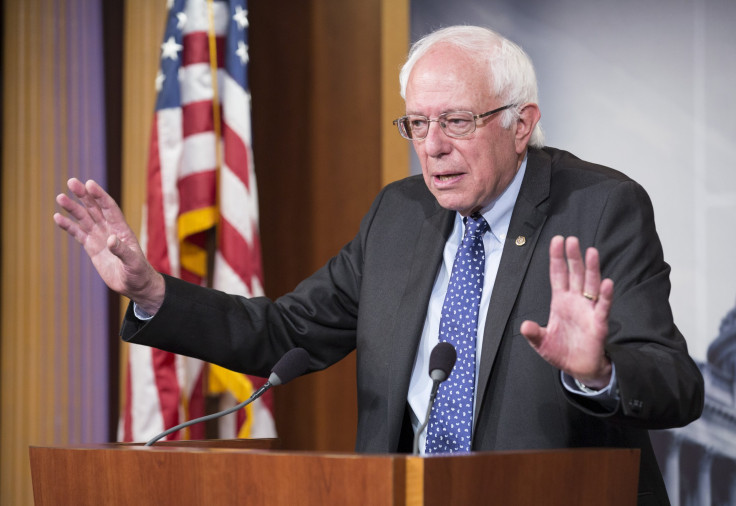Bernie Sanders’ Drug Price Bill Would Save Billions, Congressional Analysts Say

Allowing Americans to purchase lower-priced medicines from other countries would save the federal government alone more than $6 billion, according to a new analysis from the Congressional Budget Office. The report comes as the pharmaceutical industry has ramped up its lobbying — including against a legislative initiative that would let Americans purchase lower-priced medicines from countries such as Canada.
Under existing law, drugmakers are permitted to produce pharmaceuticals abroad and then import them into the United States, where on average they charge Americans the highest prices for medicines in the world. However, while drugmakers themselves are allowed to import medicines, current law prohibits U.S. consumers and pharmaceutical wholesalers from doing so, even when the same medicines are sold at much lower prices abroad.
Spending millions on campaign donations and lobbying, the pharmaceutical industry has for years successfully fought off legislation to end the prohibition. This year — nearly 17 years after President Bill Clinton’s administration killed Democrats’ drug importation legislation — the importation initiative has once again been renewed. Looking to take advantage of President Donald Trump’s promise to lower drug prices, Vermont Sen. Bernie Sanders, along with 21 Democratic lawmakers, introduced the Affordable and Safe Prescription Drug Importation Act on Feb. 28. The bill was referred to the Senate’s Committee on Health, Education, Labor, and Pensions.
CBO estimates that the change would in total reduce federal government drug spending by more than $6.8 billion over ten years, including a reduction of $5.1 billion in direct spending and roughly $1.7 billion in increased revenue.
Before introducing the new legislation, Sanders and Democratic Sen. Amy Klobuchar of Minnesota in January introduced a budget amendment allowing Americans to purchase drugs from Canada. In contrast to typical party-line votes, 13 Republicans voted with the Democrats in supporting the amendment, while 13 Democrats joined the remaining Republicans in voting it down. The tally was 52-46 against the amendment.
Among the Democrats who voted against the cost-saving measure was potential 2020 presidential candidate Sen. Cory Booker of New Jersey, a state that is home to several major pharmaceutical companies including Bayer USA, Johnson & Johnson and Merck & Co. As The Intercept reported, Booker’s argument for voting against the measure was the same as that of the primary pharmaceutical trade organization, the Pharmaceutical Research and Manufacturers of America (PhRMA). Both Booker and pharmaceutical representatives argue that drugs from Canada have insufficient safety standards.
“Any plan to allow the importation of prescription medications should also include consumer protections that ensure foreign drugs meet American safety standards,” said Booker in a statement to Jezebel. In the 2014 election, when Booker ran for Senate, he had the highest total — over $220,000 — in campaign donations from the pharmaceutical manufacturing industry of any member of Congress.
Like Booker, the drug industry’s lobbying group, PhRMA, warns that Canada can’t properly regulate the medicine that is shipped through its borders. However, Canada does not suffer from problems with poor quality or counterfeit drugs.
"My first response to that is, show me the dead Canadians. Where are the dead Canadians?" said Republican Minnesota Gov. Tim Pawlenty in 2003 as he unsuccessfully asked the federal government to allow his state to import cheaper drugs from the the United States’ northern neighbor.
Some drugs sold in the United States are in fact “fully manufactured overseas, or made in the United States but have some foreign ingredients,” according to the Food and Drug Administration, which for this reason already has in place a robust mechanism for inspecting drugs across the globe.
Critics, including writers at conservative think tanks such as the Cato Institute, argue that importing drugs would also import foreign price controls that, they claim, would drastically cut the drug companies’ funds for research and development of future drugs.
After intense pressure from progressives, Booker reversed course and teamed up with Sanders and other Democrats to sponsor the Affordable and Safe Prescription Drug Importation Act in February. That, however, did not eliminate all Democratic Party opposition to the initiative.
During May deliberations over an FDA authorization bill, Sanders, and Democratic Sens. Bob Casey and Elizabeth Warren proposed an amendment allowing for the importation of drugs from FDA-approved facilities in Canada. The amendment was “laden with protections,” according to Casey. But Democrats Patty Murray (WA) and Michael Bennet (CO), two big beneficiaries of pharma campaign cash, voted against it in committee, and it failed 13-10.
Overall, campaign spending by the pharmaceutical industry is skyrocketing. Congressional donations from pharmaceutical PACs are up 11 percent as compared with a similar time frame in 2015, and donations to ranking members of health-related committees have risen by 80 percent from two years ago. Lobbying is also on the rise, according to a Kaiser Health News analysis.
© Copyright IBTimes 2024. All rights reserved.





















